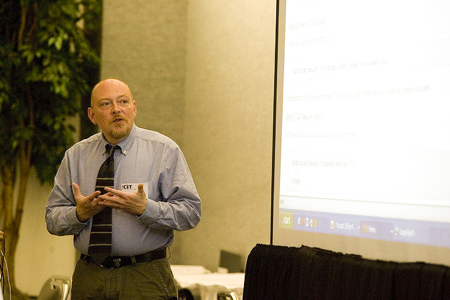An Inside Look at Duke University’s MOOC Initiative
MOOCs (massive open online courses) are difficult to assess when you don’t have hard data. As colleges begin to implement these courses, data is slowly becoming available, and the integrity of the classes can be evaluated.
It’s a challenging process, and it requires experienced educators and technologists to find value in the data. For that reason, Duke University’s Randy Riddle has been working with professors and other faculty for the last 13 years, honing his expertise and delivering tools that boost engagement and learning.
Riddle is also an energetic blogger. His work helped Duke’s CIT blog earn a spot on this year’s list of must-read higher education tech blogs. Riddle was kind enough to answer a few questions about technology, MOOCs and the future of higher education.

EdTech: Can you provide us with some information about your background and current role at Duke University?
Riddle: I have a Bachelor of Science degree in public and applied history from Appalachian State University. I first started working in instructional technology at Wake Forest University in the 1990s, in the early days of the web. My studies were about using history in nontraditional settings — public education, museums, archives, documentary film — so helping faculty use technology in teaching was a natural fit.
I've been at Duke University since 2000. I'm a senior academic technology consultant in Duke's Center for Instructional Technology. We help faculty with integrating and planning for using technology in their teaching — everything from improving lectures and using learning management systems to implementing blogs and tablets in a course, to developing new curricula or a distance program.
I work specifically with social sciences faculty, but we help out in different areas, depending on our expertise. I've probably worked with faculty in just about every department and professional school since I've been at Duke.
In my spare time, I do research on radio and film history, the LGBT community and other topics, creating documentaries, websites, blogs and using different kinds of tools to bring material together. I use the work as a kind of "test bed" for exploring technologies that faculty use in teaching.
EdTech: Why is Duke exploring MOOCs?
Riddle: It's part of Duke's larger explorations of online learning and new technology explorations that have been going on for several years. Duke has offered online and hybrid online programs through the School of Nursing, the Nicholas School of the Environment, law, engineering and other graduate and professional programs. We've also experimented with some undergraduate online courses during summer sessions.
There are several reasons that Duke is exploring MOOCs specifically. The university saw it as a way to engage with the public. MOOCs let anyone take an open online course and get a better idea of the kind of research that Duke faculty are doing, and it supports the university's mission of knowledge in service to society. A Duke faculty member offering a MOOC course might make a difference to someone interested in a topic in an area where the subject isn't offered or might give them another perspective they can take back to their own university.
Duke is also using MOOCs as an opportunity for our faculty to think about new ways of teaching our campus students. Several faculty involved in the university's MOOC efforts are thinking about how they might "flip" their classroom — the practice exercises, lecture videos, activities are things they can use to enhance their Duke courses. Some are using it to refine materials, assessments, or practice exercises they already use in courses. Others are exploring MOOCs as a way to get a different perspective on their subject area — faculty teaching a course can get ideas and viewpoints from people around the world that are exploring a topic together in forums, Google Hangouts or social media.
EdTech: How are you measuring the success or failure of MOOCs?
Riddle: Duke has only been involved with MOOCs for one year, though it seems much longer when you're in the middle of helping faculty pull MOOCs together. We're really in just the first stages of measuring outcomes. It's been focused on just getting a handle on the raw numbers — the level of interest in MOOCs, the motivations individuals have for exploring or completing a MOOC, the types of people that are MOOC students.
I can't speak for Duke's administrators or deans on future plans, but I imagine the interest in outcomes will shift in the coming months to how it impacts the campus. We'll probably start looking at how faculty are taking their experiences in MOOCs and using that in the classroom and if the changes they make get students more engaged in courses they're taking here. What we're finding out from these early MOOCs about best practices for producing content and designing homework and assessments for MOOCs will have a ripple effect on the distance and hybrid online programs Duke already offers. We can see with large groups of students what works and what doesn't work in designing and teaching an online course.
Like other institutions, Duke is watching larger trends with MOOCs and what eventual role they will play in the university. Some of Duke's courses are accredited by the American Council on Education for credit. We will probably be looking at how successful those courses are for institutions that are working with students earning credit in the courses and developing MOOCs or other types of distance courses that can help other institutions.
Some of what the university will likely look at won't be just raw numbers on students taking or completing a MOOC, but the broader impacts on the Duke student experience, what faculty can take from teaching a MOOC that enhances their research and teaching, and the university's engagement with the larger academic community.
EdTech: If you had to pick one piece of hardware that increases student engagement, what would it be? Software?
Riddle: The one piece of hardware that almost never fails to engage students is a whiteboard — anything that gets students in a classroom to get out of their seats, talking to each other, debating and solving problems creates a dynamic class experience.
But seriously, as far as a technology, it's difficult to pick one. It depends on how the faculty member wants students to engage with the material. Tablet and mobile computers can get students to more easily gather data, images, sound or video in the field to explore a topic around them. Personal response systems and software can get large groups of students more involved in a lecture or conversation about a topic in class. Virtual-worlds hardware and software can get students to explore, change and debate a space or object.
I'm more of a pragmatist about instructional technology — the best hardware and software for student engagement and learning is a professor that cares about teaching and is interested in improving student learning. The tools they use are just a means to solve the problems they are trying to overcome in their classroom and move their students to a new level. You select the best tool for the job at hand.
EdTech: What is the “next big thing” in higher education technology?
Riddle: There's a great deal of discussion about the use of Big Data in research and education. The technologies for exploring and visualizing data have become much easier to use in the past few years and the Internet, and tools we use, like Learning Management Systems, are giving us data to work with.
MOOCs are one example. A faculty member with thousands or tens of thousands of students in a course could use broad data from a MOOC to evaluate the quality of assessments and quizzes they use in a course — you have a pool of students working through practice exercises or a quiz that's much larger than what you might have in a face-to-face classroom.
There are still several problems to overcome. If an institution wanted to use broad student data from their Learning Management System to analyze and look at ways to improve student learning on their campus, there would have to be some agreements between departments and programs about standards for the data itself and ways to protect individual student privacy. A faculty member that would want to use Big Data from the Internet — like getting students to analyze language and issues on news websites in a politics class — would need to deal with technical and intellectual property to get access to and work with data from commercial companies.
Crowdsourcing is the part of Big Data that we've not really thought about yet. For the past few years, I've been involved with the Old Time Radio Researchers Group. It's a crowdsourced effort to make public-domain radio shows from the twenties through the fifties available with documentation and background material. That effort, with only a hundred or two hundred volunteers, has made thousands of shows and information about them available at archive.org.
What if you had tens of thousands of people in MOOCs or other kinds of distance education programs or university-led social media doing the same thing with the thousands of radio programs or millions of recordings housed at the Library of Congress, the National Archives and other libraries?
What if you had tens of thousands or millions of people just gathering data about things they see and experience everyday?
It's exciting to think what crowdsourcing could do to gather and catalog data for researchers and what it could mean for just about all fields in academia. It could have a big impact on how we teach — how we engage students with collecting data or interpreting primary sources and what they are capable of doing with access to electronic information we only dreamed about a generation ago.
Check out Duke’s Center for Instructional Technology blog to read Riddle’s posts.








